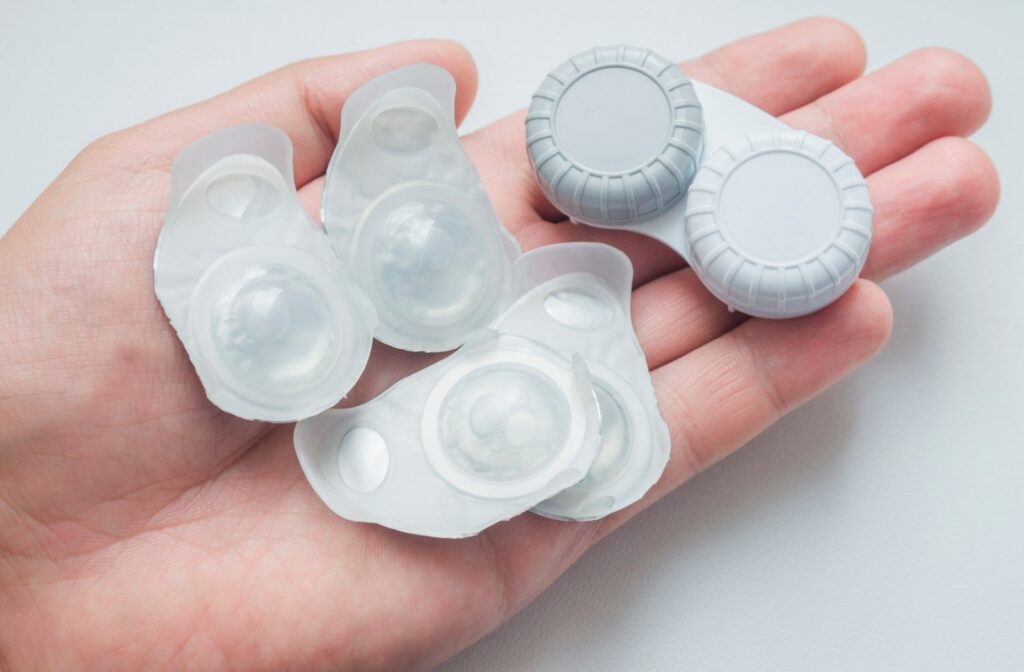Contact lenses are pretty amazing, aren’t they? They not only help us see clearly but can also fit seamlessly into our lifestyles, even if we have dry eyes. So whether you’re on the town with friends or hanging out with family, you need to know your contacts have your back.
However, like all good things, contact lenses have an expiration date. They can’t last forever—but, there are ways to tell if your contacts have expired.
How Do Contact Lenses Expire?
Contact lenses need to stay sterile to be at their most effective. That’s why soft contact lens manufacturers keep fresh lenses snugly packed in blister packs filled with saline solution.
These packs are airtight, protecting the lenses from bacteria. If you look at the box, you should spot a date telling you when the pack will no longer be good. If that date’s in the past, bid farewell to the box and get yourself a new set.
If the seal on the blister pack fails, contaminants may find their way into the solution. With the solution unable to protect the lenses and the seal open to the air, bacteria can turn your contact lenses into a breeding ground. Not exactly an appealing image, right? So, keep an eye out for fresh solution and intact seals.
How Long Can You Wear Contact Lenses For?
The date on the side of the lens’s box isn’t the only thing you have to look out for. You might also be in trouble if you wear your lenses too long. The amount of time you can wear your contact lenses depends on the type of lens.
Soft Contact Lenses
Soft contact lenses are the most commonly worn and often referred to as disposable lenses because they’re typically thrown away after each use. However, the wear schedule for soft lenses can vary.
- Daily-wear lenses are worn throughout the day, then removed and cleaned at night.
- Extended-wear lenses are designed to be worn for several days to a week before being taken out to be cleaned and reinserted. Though they are approved by Health Canada, some people can’t tolerate extended wear, and we suggest you still remove them every day.
Some soft contacts are good for the day you open them, then need to be thrown out. Others can be used for anything from 2 weeks to a month as long as you store them in a protective case with contact lens solution. Because these lenses are made of flexible plastics, they generally offer a more comfortable fit right off the bat.
But there’s a catch. The same hydrogel that makes soft lenses so comfortable also makes them can act like sponges, absorbing various substances. So if you use an expired contact solution or the blister pack seal is compromised, contaminants can hitch a ride on your lenses and potentially cause eye infections.
Rigid Gas Permeable (RGP) Lenses
Rigid gas permeable (RGP) lenses have many advantages, from clearer vision to correcting astigmatism. But they also have significant differences when we’re talking about lenses expiring.
These lenses are more durable and resistant to deposit buildup compared to soft lenses. Unlike soft lenses, not all RGP lenses have strict expiration dates. The same pair can stay in your life for 2–3 years with proper care.
However, you still have to ensure you don’t overwear RGP lenses, as bacteria can get trapped against the eye and cause infection. You’ll also want to clean your contacts with the correct solution so you don’t damage them.

What Happens If I Wear Expired Lenses?
Our eyes are incredible but delicate organs, and since contact lenses sit directly on their surface, some risks are involved. Using expired or not properly cared for lenses can invite bacteria and debris into our eyes, potentially leading to eye infections. We definitely don’t want that!
Watch out for these symptoms that may indicate an eye infection:
- Eye pain
- Redness
- Sensitivity to lights
- Watery eyes
- Blurry vision
- Stringy mucus discharge
- The feeling of something stuck in your eye.
If you notice any of these signs, it’s crucial to reach out to your eye doctor as soon as possible. With an early diagnosis, we increase the chance of providing the necessary guidance and treatment to get your eyes back to their healthy, happy state.
Contact Lens Care With Experience in Edmonton
While we can spend a lot of time discussing bacteria and infections, there is another way your contact lenses can expire: your prescription! If your prescription expires, your contacts won’t work how you need them to.
Fortunately, our friendly team at Total Focus Optometry is eager to assist and get you seeing clearly again. A prescription is typically only valid for 1–2 years, so we offer comprehensive contact lens exams to determine the lens most suitable for you.
Your eyes are precious, so let’s keep them healthy and happy. Book a contact lens fitting today, and let’s make sure your contacts are working for you.



